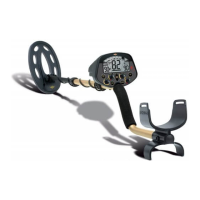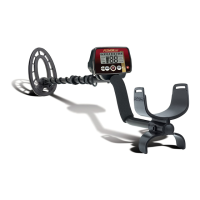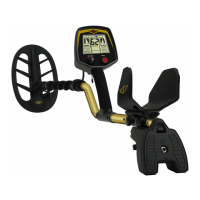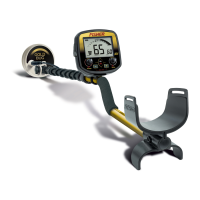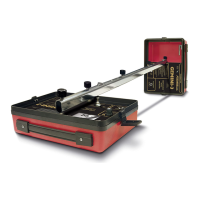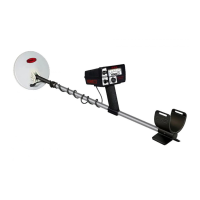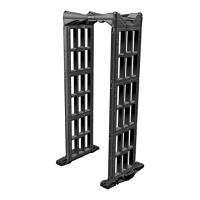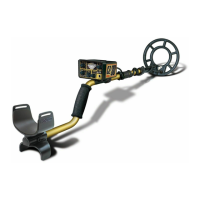Detecting Activities (continued)
Hillsides are the best areas for gold prospecting using a metal detector, because hillsides
cannot be cleaned out by panning and dredging the way streams can. Also, gold on
hillsides, not far from its source vein, tends to be larger, and hence more readily detected,
than alluvial (placer) gold which tends to get pounded to pieces and worn away as it rolls
along the streambed with gravel during floods. Gold is valuable because it is a scarce
commodity. Even in a good gold producing area, you will often spend an entire day
without finding any gold. Meanwhile you will dig bits and pieces of other metal-- birdshot,
shells and bullets from hunting and target practice, bits of rusted barbed wire, chips off
shovels and other mining tools, rusted tin cans, etc. Hot rocks -- rocks containing
concentrations of iron oxides that sound like metal when you pass over them -- are also a
nuisance in many gold areas. Discrimination is usually ineffective because the loss of
sensitivity resulting from discrimination is enough to cause those little nuggets to vanish.
If you have gone many hours without finding gold and are wondering if there is something
wrong with your metal detector or how you are using it, the most important clue is this: if
you are digging tiny pieces of trash metal, then if you had swept over gold nuggets, you
would have dug them too!
Because most gold nuggets are tiny, and are usually found in soil which is high in iron
oxide minerals, serious gold prospecting requires a detector with high sensitivity and true
ground balanced motion all metal operation. Run the machine with the sensitivity high
enough to hear some noise from ground minerals, and learn the language of the sounds you
hear. Headphones are recommended unless consideration for safety (for instance
rattlesnakes) rules them out. Move the searchcoil slowly and deliberately, carefully
controlling its height above the ground to minimize noise from iron minerals in the soil. If
you hear ground noise, your Ground Setting could be a bit off, so perform the ground
balancing procedure again. As you walk even a very short distance, ground conditions can
change. The ground geology typically associated with gold will tend to change over very
short distances.
The Fe
3
O
4
bar graph indicates the amount of iron mineralization in the soil. In most gold
fields, especially alluvial (placer) deposits, gold tends to be associated with iron minerals,
especially magnetite black sand. If you know this to be the case in the area you're working,
you can maximize your gold recovery by concentrating your effort on areas where the bar
graph indicates higher amounts of iron mineralization.
Gold prospectors are mostly a friendly bunch, and willing to spend some time showing a
beginner how to increase his odds of finding the yellow stuff. Many will invite you to
search on their claims (if they have any) once they get to know you. In some gold areas, a
lot of the terrain is under claim, so you need to learn how to recognize posted claims and
stay off of them unless you have the claim owner's permission. Prospecting clubs such as
the GPAA often own claims which are open to their members, and sponsor group outings
to good gold areas.
To dig into the ground and pull out a precious piece of yellow metal that you are the first
person on earth to see, can be a thrilling experience. If you love being outdoors, have
patience, and can stay motivated by the prospect of finding that next nugget, then beeping
for gold may be the hobby for you. Not many get rich prospecting, so think of it as outdoor
recreation where your finds might defray the expense while having fun doing it!
